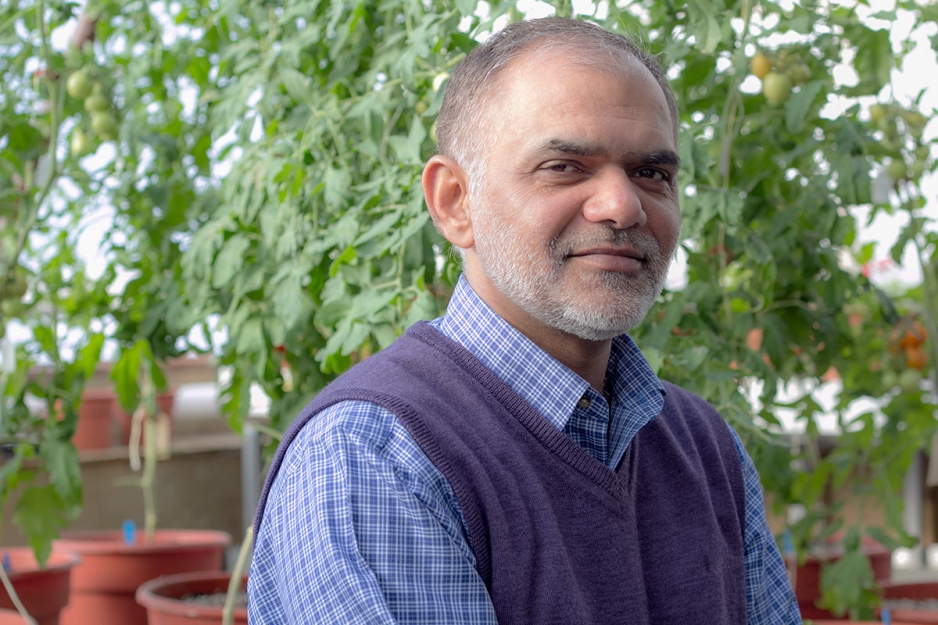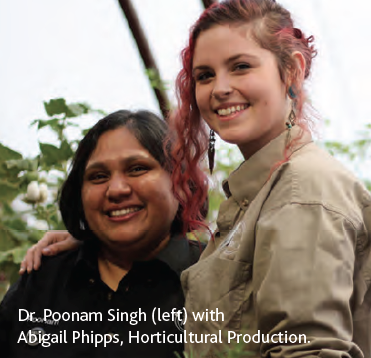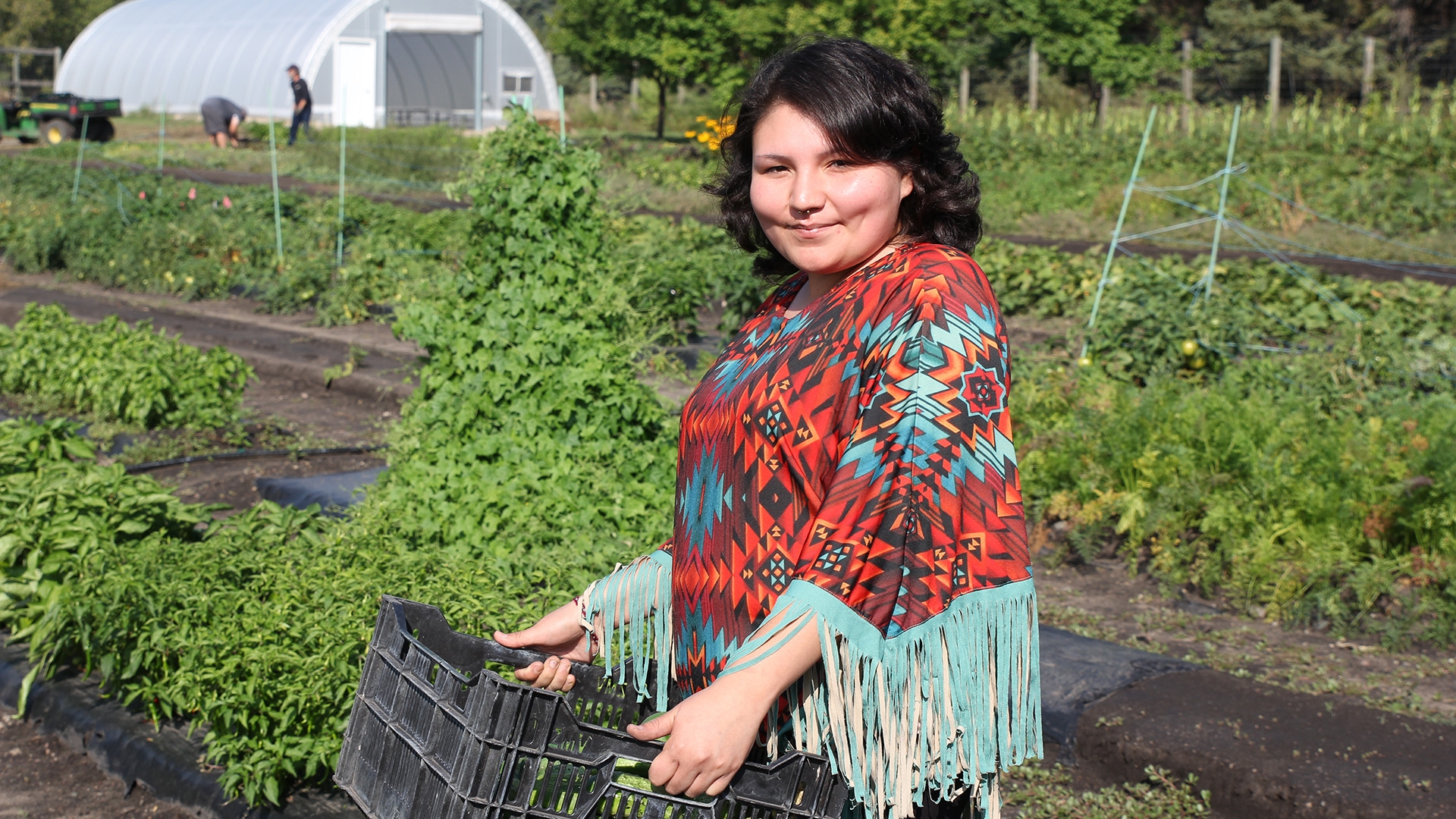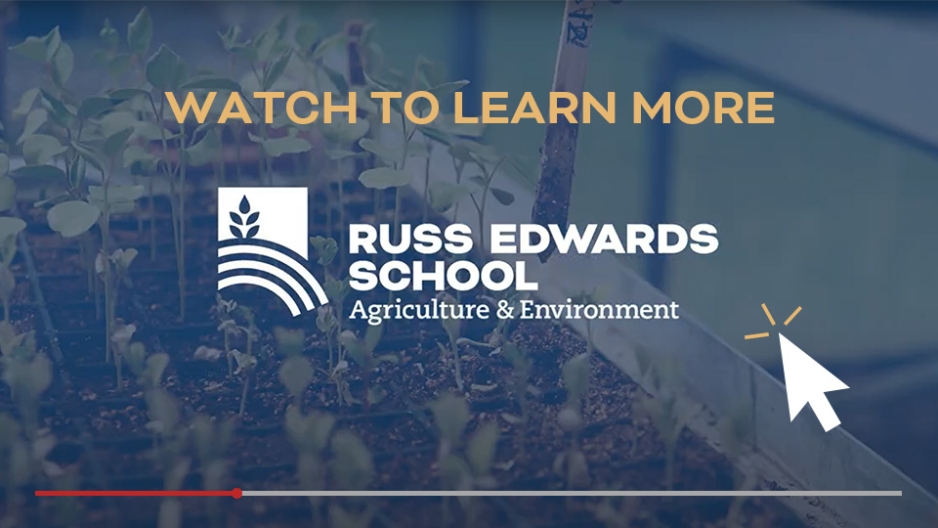Horticultural Production
Overview
Assiniboine’s nine-month certificate program provides key skills for entry-level positions in food production of fruits and vegetables, greenhouse production and nurseries.
Horticulture is a rapidly growing industry offering rewarding careers in both rural and urban settings across Canada.
KEEP ME IN THE LOOP!
Fill out the form below to receive more information about our program and related events.
Program Learning Outcomes
- Identify a wide range of plants and understand their basic characteristics and growth requirements.
- Apply basic horticultural practices, including planting, pruning, and fertilizing, to maintain healthy plants in a variety of settings.
- Identify and manage common pests and diseases that affect plants, using integrated pest management strategies.
- Propagate plants using a variety of techniques, including seed propagation, vegetative propagation, and tissue culture.
- Apply sustainable and environmentally friendly practices to horticultural activities, such as composting, water conservation, and soil conservation.
- Understand and apply the principles of plant nutrition and soil science to promote healthy plant growth and development.
- Operate and maintain basic horticultural equipment and tools.
- Manage and operate a greenhouse facility, including understanding the principles of greenhouse design, climate control, and irrigation systems.
- Cultivate and manage a variety of crops in a greenhouse environment, including understanding plant physiology, growth requirements, and pest and disease management strategies specific to greenhouse crops.
- Understand and comply with relevant safety regulations and guidelines, including those related to chemical handling, equipment operation, and personal protective equipment.
- Effectively communicate horticultural information and recommendations to clients, colleagues, and the public, using both written and oral communication skills.
Examples of what jobs graduates from this program can do:
- Positions open to graduates include fruit grower, vegetable grower, nursery assistant, Integrated Pest Management (IPM) technician, plant propagator, garden centre worker, marketing and sales assistant, and research assistant.
- Graduates may continue their studies at the diploma or degree level.
Success Factors
You might be a good fit for this program if you would enjoy:
- A nine-month program leading to employment in food production or the greenhouse industry.
- Have an interest in plants and the natural environment, and enjoy working with your hands and being outdoors.
- Expanding knowledge and skills in plant cultivation, propagation, and management.
- Pursuing careers in the horticulture industry, including greenhouse management, and nursery production.
- May want to start your own greenhouse or small-scale plant production operation.
- Have a passion for plants and a desire to make a positive impact on the food supply chain or natural environment.
- A valid driver’s license and access to a vehicle is strongly recommended given the potential need to travel for practicum placement.
The industry and program environment require individuals to:
- Have physical strength and stamina as well as the mobility and motor skills to undertake the required tasks.
- Work in outdoor settings in varied terrains such as a greenhouse, field or pasture; maneuver around equipment and plants.
Admissions
Admission Requirements
- A complete Manitoba Grade 12 or equivalent
- English 40G/40S or equivalent
- Consumer/Essential Mathematics 40S or equivalent
If you received your education outside of Manitoba, please review the equivalent admission requirements: Interprovincial or International.
English is the language of instruction at Assiniboine. All applicants educated outside of Canada or in a country not on the test exempt list are expected to meet the English language proficiency requirements.
No future intakes planned for parkland
We are not currently accepting applications for Parkland as there will not be a new intake of Horticulture Production.
READY TO TAKE THE NEXT STEP IN YOUR EDUCATION JOURNEY?
Start your online application today and join Assiniboine College!
DON'T MEET ADMISSION REQUIREMENTS?
If you don’t meet admission requirements, visit our Centre for Adult Learning to upgrade courses.
ALREADY HAVE A DEGREE OR DIPLOMA? GO A STEP FURTHER.
Fast-track your education journey and take advantage of one of our Advanced Diploma programs.
Careers & Connections
Career Opportunities
- Greenhouses and nurseries
- Horticultural organization
- Research production
- Weed sciences
- Composting
Connections
Assiniboine has a number of agreements with other colleges, universities and professional organizations, making it possible to apply credit taken at Assiniboine to programs at other institutions. For information on agreements, see Articulation Agreements.
Upon completion of this program, graduates will have the following certifications:
- First Aid
Tools & Supplies
This program features a fully-equipped greenhouse, tools and equipment, garden, orchard, field labs, growth chamber, classrooms and computer labs.
Our classrooms, labs and shops are equipped with the necessary equipment that you need to make the most of your experience. However, there are some tools and supplies that you will need to purchase for personal use to help you with your studies. Much of what you purchase you’ll be able to use after you graduate and begin your career.
Program Checklists, Textbooks, and Supplies
Program Checklists:
Textbooks:
Supplies:
ASSINIBOINE BOOKSTORE
Textbooks, supplies and uniforms may be purchased at the Assiniboine Bookstore at the Victoria Avenue East Campus. Booklists, tool lists and supply lists are available from your school office 30 days prior to the start date of your program.
Technology Requirements
Students in this program are required to bring their own laptop for use on-campus. The laptop must meet the technical needs outlined by the program. See Technology Requirements for detailed information.
Courses & Costs
Costs
Estimated Program Costs (Domestic students)
| Credits | 63.0 |
| Tuition | $4,090 |
| Course Fees | $1,610 |
| Students' Association fees (including Health Premium) | $635 |
| Estimated textbooks, tools, and supplies | $700 |
All fees are estimated and subject to change without notice.
Estimated Program Costs (International students)
| Credits | 63.0 |
| Tuition | $17,140 |
| Course Fees | $1,610 |
| Students' Association fees (including Health Premium) | $635 |
| Required Health Insurance | $825 |
| Estimated textbooks, tools, and supplies | $700 |
All fees are estimated and are subject to change without notice. All international students must purchase health insurance. The college adds this fee to your student account and then sends your name and fee to the insurance provider on your behalf.
For more information, visit the Fees and Charges page.
Courses
To graduate with a Horticultural Production certificate, students must successfully complete 60 academic credits and 3 practical credits. The minimum passing grade for each course is indicated on the course outline. Course offerings are subject to change and may vary by intake.
Courses
| Title | Credits/CEUs | Elective | Distance | PLAR |
|---|---|---|---|---|
1st Aid - Emergency (HLTH-0030)Basic First Aid and CPR techniques taught in an interactive environment for individuals and employees who want an overview of First Aid and CPR in the workplace or home. The course covers skills needed to recognize, prevent and respond to cardiovascular emergencies for adults, CPR and other topics such as choking, airway and breathing emergencies, and prevention of disease transmission. This course meets the minimum regulations for Workplace Health and Safety for Basic First Aid. Participants who meet the required standard receive a nationally recognized certification that is valid for three years. |
0 credit(s) | No | No | No |
Business Skills (BUSN-0158)The horticulture industry requires individuals who possess essential business skills and practices to manage horticultural operations and processes. In this course, students learn and evaluate the essential skills required for successful operations at a horticultural workplace and commitment necessary to successfully operate and encounter challenges of a horticultural business. Students learn about personal and interpersonal skills, decision-making processes, and be able to demonstrate their capacity to develop and execute business strategies. |
6 credit(s) | No | No | No |
College Foundations (PEDV-0356)This course improves students' ability to navigate the college experience and environment, including student's rights, roles, and responsibilities. In this course, students reflect on their skills, attitudes, and expectations and develop learning strategies to help them to become successful, resilient, and self-directed learners. The course covers topics such as success in online learning, time management strategies, learning strategies, assessment taking strategies, academic integrity, information and digital literacy, and wellness, among others. It integrates elements of student orientation. |
0 credit(s) | No | No | No |
Food Safety and Security (AGRC-0283)Students will learn about food safety and food security by focusing on quality control and on safe and sustainable production practices. Students will explore social, ecological and economic principles of sustainability within the context of food production systems. They will critically analyse the relationships among specific components of industrial agricultural systems, including soil, water, climate change, plant genetic resources, resource management and genetically modified foods. Students will evaluate traditional and contemporary food systems and their implications for food security and sustainability. |
6 credit(s) | No | No | No |
Greenhouse Operations & Mgmt (AGRC-0242)This course examines the sustainable production, handling and marketing of greenhouse-grown vegetables, herbs and floricultural crops in season and year-round greenhouse operations. Topics include environment control systems, planning and planting schedule, media control and plant management, water systems, composting, water nutrient capture, cleaning and sanitation. |
6 credit(s) | No | No | No |
Growing Media (AGRC-0258)This course will introduce students to the nature and properties of various growing media including soil, soilless, hydroponic, compost mix and other media substrates. Students will learn about soil water relationships and physical, chemical and biological properties of soil that influence plant growth. Students will perform various soil tests to examine the effect of growing media properties such as pH, electrical conductivity, salinity, and movement and retention of water. |
6 credit(s) | No | No | No |
Horticultural Industry (AGRC-0285)This course enables students to explore and gain experience in industry-specific skills while visiting horticultural related industries/businesses throughout this course. In this course students will learn procedures and operations, practices and processes, and explore ways of enhancing sustainability in food production systems. Students will also examine issues related to the horticultural industry, learn about safe and healthy working practices, industry standards and codes, and explore career opportunities. The knowledge and skills acquired in this course will prepare students for skilled work placement in the horticulture industry. |
6 credit(s) | No | No | No |
Horticultural IPM (AGRC-0247)Principles of Integrated Pest Management (IPM) are introduced and include identifying, monitoring, forecasting and managing environmental and pest conditions that impact horticulture crops including weeds, viruses, bacteria, phytoplasmas, fungi, algae, protozoa, nematodes, arthropods and rodents. Students learn to diagnose problems, provide solutions and predict how the manipulation of growing conditions impact other factors. Topics include basic chemistry, legislation and regulations, labelling, toxicity, handling practices, environmental protection, application equipment, emergency response and public relations. |
6 credit(s) | No | No | No |
Horticultural Methods (AGRC-0279)This course provides hands-on practical experience in methods and techniques used in horticultural crop production systems. Students learn about field tillage and land preparation methods and practices, experimental methods and techniques used for crop evaluation, crop improvement, and plant propagation methods. Students also learn about propagated plant growth and agronomic requirements, plant development and plant stress management. |
6 credit(s) | No | No | No |
Horticultural Science (SCIE-0074)This foundation course deals with details of morphology, physiology and taxonomy of plants. Students learn how structures and processes affect overall plant growth and response to the surrounding environment. Students will develop good knowledge on the basic botany of plant species and plant identification techniques. Also, students will be able to describe the functions of the various plant parts in relation to food production, reproduction, aesthetic value, environmental impact, and how they are manipulated by biotic and abiotic factors. |
6 credit(s) | No | No | No |
Nursery/Ornamental Hort (AGRC-0286)This course will enable students to learn about general production methods and management techniques for field and container grown nursery and ornamental crops including annuals, trees, shrubs and perennial plants. The course will also focus on the production practices of selected potted and cut flower crops grown in greenhouses. Students will perform various propagation techniques including seeding, micropropagation, cuttings, grafting, division, layering, and propagation through specialized plant parts. The course will also provide information on principles of landscape design using different plant materials. |
6 credit(s) | No | No | No |
Practicum - HRTPR (PRAC-0264)Prerequisite: Cumulative weighted grade point average (CWGPA of 2.0 or greater) |
3 credit(s) | No | No | No |
Vegetable & Fruit Production (AGRC-0289)This course covers classification of the different types of fruits and vegetables, cultural requirements and crop management, as well as produce handling and marketing. Students examine and apply the concepts of sustainability, production programming, soil and fertility management, equipment selection, irrigation, integrated pest management, harvesting and post-harvest management, cooling and storage of fresh fruits and vegetables. |
6 credit(s) | No | No | No |
Sajjad A. Rao BSc, MSc, PhD

Dr. Rao is an accredited Canadian Plant Breeder and Agrologist, with over 25 years of progressive experience in applied research and teaching. Dr. Rao holds a PhD degree in plant science from The University of Liverpool, England U.K.
He has served in many academic and research positions, committees, boards of directors, and as an external examiner for post-graduate research studies with various universities. In addition to his academic work, Dr. Rao has experience working for multinational agricultural companies, holding senior-level management positions in which he developed a passion for leadership in R&D strategies.
In his professional career, Sajjad has made significant contributions in developing wheat varieties for North America, and in commercializing corn hybrids in the Asian-Pacific sphere. Currently, Dr. Rao’s research engages him in innovation of sustainable greenhouse production technologies, food systems, and in employing novel genetics in horticultural and agronomic field crops.
Poonam Singh BSc, MSc, PhD

Dr. Poonam Singh joined the college in 2015 as a Professor of Horticultural Science in the Horticultural Production and Sustainable Food Systems programs. She holds a Bachelor of Science in Agriculture, a Bachelor of Education degree, a BC Provincial Instructor diploma, a Masters of Science in Landscaping and Floriculture, and a Doctorate in Horticulture.
Dr. Singh’s work history includes working as a Research Fellow at the Institute of Himalayan Bioresource Technology (India), as an Assistant Professor at the Punjab Agricultural University (India), as a Scientist at the Institute for Sustainable Horticulture, BC, and as a faculty member at the School of Horticulture, Kwantlen Polytechnic University, BC.
Dr. Singh’s research focuses on developing sustainable technologies for the greenhouse production of horticultural crops, evaluating new soilless media/substrates, hydroponic crop cultures, vertical farming, and horticultural crop physiology. Dr. Singh has been working in various applied research projects aimed at adopting sustainable practices and improving the production efficiency of horticultural farms. Dr. Singh’s collaborative project with Mayfair farms (Portage La Prairie, MB) and the Vegetable Growers of Manitoba Association provided Manitoba onion producers with critical information on the incidence and prevalence of Botrytis neck rot disease and options for its management. In another collaborative research project with Shelmerdine Garden Center (Winnipeg, MB), she developed sustainable pest management strategies for use in commercial floricultural greenhouses. This approach gave customers organic, pesticide-free products and helped the nursery industry keep up with the changing trends of the horticulture industry. Another partnership with Vermillion Growers (Dauphin, MB) helped them to adopt sustainable crop production technologies by testing the latest products and technologies like root-zone oxygenation, biofertilizers, growth promotors, bio-stimulants to enhance greenhouse vegetable production. Her current research project with Vanderveen's Greenhouse Ltd. (Carman, MB) focuses on exploring new soilless growing media blends to partially or completely replace peat for improving the production of ornamental crops in greenhouses. Dr. Singh’s research is helping growers in reducing production costs, increasing resource efficiency, and contributing to long-term economic and environmental sustainability.





